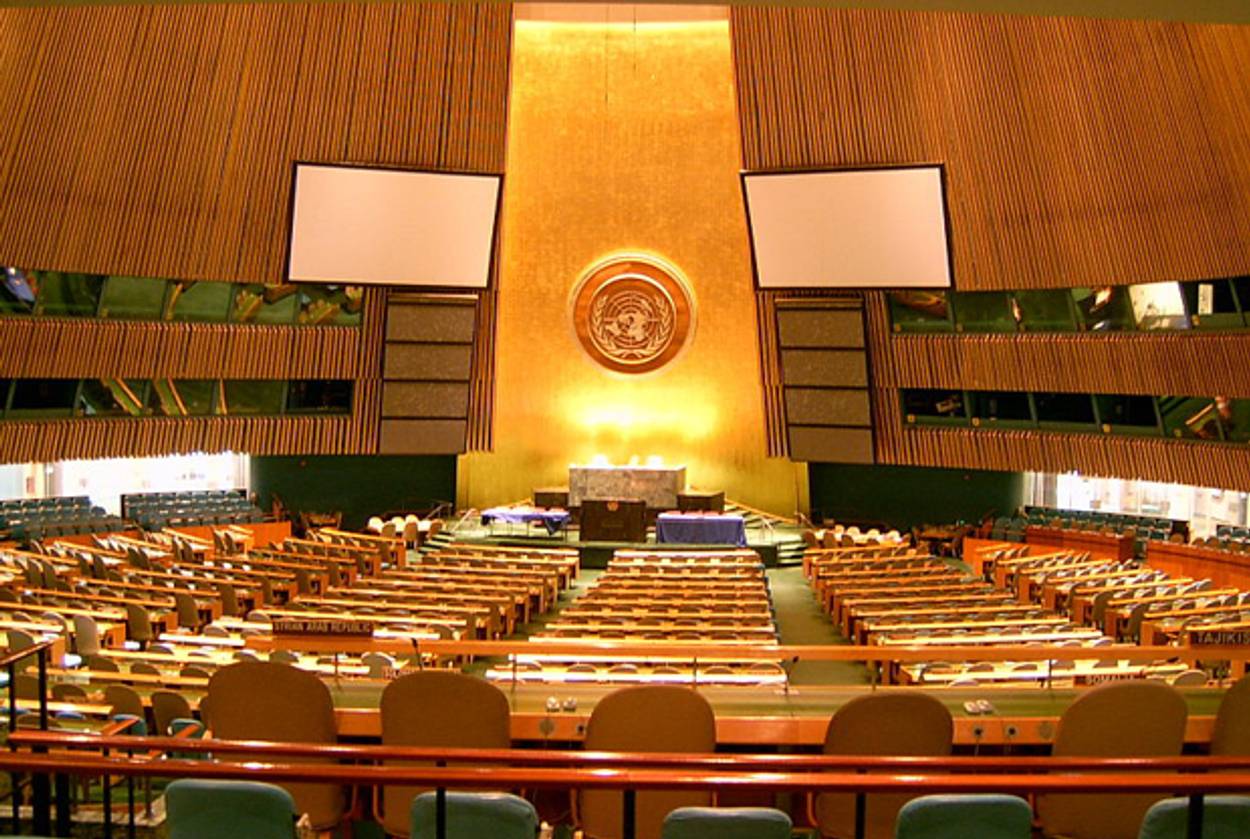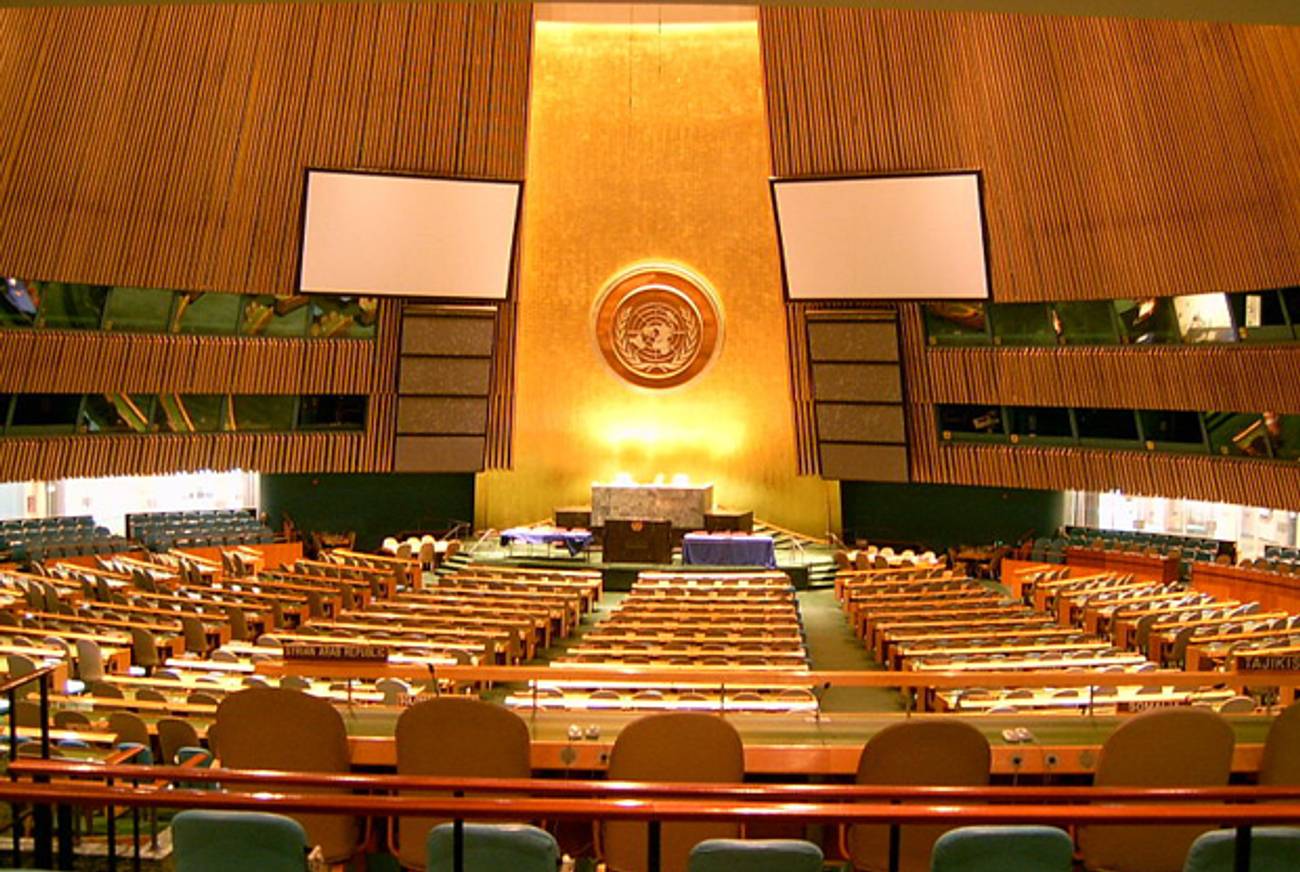Four Ways the U.N. Has Messed Over Israel
Declaring Zionism to be racism and other exciting exploits over the years




From peacekeeping missions to food aid, the United Nations does many good things in the world. Its treatment of Israel, however, is not one of those things. In the words of Democratic Sen. Tim Kaine, the chairman of the Senate Foreign Relations subcommittee responsible for the Middle East, Israel is “the perennial punching bag at the United Nations.” It is subject to “a barrage of obsessive, unbalanced, and relentless criticism,” says Susan Rice, who served as President Obama’s ambassador to the U.N. for five years. It faces “an overwhelming sense of hostility,” adds Richard Grenell, who served as the spokesman for the U.S. mission to the U.N. for eight years under George W. Bush.
But maybe this is all hyperbole meant to placate pro-Israel audiences back home? Might U.N. criticism of Israel be in proportion to the problems arising from its policies? Surely other countries are treated similarly when their actions run afoul of the U.N.’s high moral standards. Well, not quite. As American University’s Kenneth Anderson, who served as an expert on the 2004 congressional task force on U.N. reform, put it to me, “zealotry and bigotry and direction against Israel … bears no rational basis to what might be legitimate arguments over policy.” Here are four examples that prove his point:
1975: U.N. Votes that “Zionism is Racism”
In its entire history, the U.N. has only declared one form of nationalism to be inherently bigoted–Jewish nationalism. On November 10, 1975, the U.N. General Assembly adopted Resolution 3379 by a vote of 72-35 (with 32 abstentions), which declared “Zionism is a form of racism and racial discrimination,” effectively outlawing the Jewish state. Daniel Patrick Moynihan, then the U.S. ambassador to the U.N., blasted the resolution in a thunderous speech in the plenary, proclaiming “The United States rises to declare before the General Assembly of the United Nations, and before the world, that it does not acknowledge, it will not abide by, it will never acquiesce in this infamous act,” adding, “the abomination of anti-Semitism has been given the appearance of international sanction.” Decades later, Moynihan was vindicated, when the U.N. repealed the resolution in 1991, though the spurious charge it leveled remains a staple of U.N. discourse to this day.
The General Assembly
Of course, the “Zionism is racism” resolution was only a particularly pointed consequence of the U.N. General Assembly’s broader anti-Israel slant. As U.S. ambassador to the U.N. Samantha Power has observed, because the G.A. is dominated by non-democratic countries often seeking to divert attention from their own human rights transgressions, Israel serves as a convenient scapegoat and “reliable way of changing the subject.” (It helps that 20 percent of U.N. member states do not even accept Israel’s right to exist.) Thus, in 2012, the G.A. passed 22 resolutions condemning Israel, and only four against other individual countries. As Abba Eban, Israel’s first ambassador to the U.N., is said to have quipped, “If Algeria introduced a resolution declaring that the earth was flat and that Israel had flattened it, it would pass by a vote of 164 to 13 with 26 abstentions.”
This bias has impacted not just Israel, but Jews everywhere. In 2003, JTA reported that “the first resolution explicitly condemning anti-Semitism was offered, but its sponsor, Ireland, later withdrew it due to lack of support.” Such is the inevitable outcome of the U.N.’s American Idol approach to international norms, in which popularity and majority determine morality and legality.
The Human Rights Council
You might think that the world’s highest human rights body would be the exception to the anti-Israel rule. You would be wrong. Founded in 2006 to replace the corrupt Human Rights Commission, the U.N. Human Rights Council reserves a permanent place on its agenda for Israel, ensuring that it will be condemned at every meeting. All other violations in the world are lumped under a separate, non-country-specific agenda item.
The council is stacked with some of the world’s worst human rights abusers, all of whom use the platform to excoriate Israel while scrupulously insulating themselves from criticism. Current members include Congo, Pakistan, and Libya, with Russia, China, Cuba and Saudi Arabia expected to be elected this November. As one former senior member of the Israeli U.N. Mission put it, “When you’ve got regimes like Syria, Zimbabwe and North Korea lecturing you about cultural and economic and human rights, you don’t need a PhD in human rights to understand that there’s something fundamentally wrong.” The problem is not that Israel is blameless or undeserving of scrutiny. It is rather that the international organization empowered with policing human rights spends most of its time prosecuting Jews. Indeed, the body was recognized as so morally bankrupt that Ronan Farrow, former advisor to Secretary of State Hillary Clinton, called for it to be abolished–in 2008.
Exclusion From All Regional Groups
To be elected to most U.N. bodies, including the powerful Security Council, a country must be nominated by its regional collective. The U.N. has five such groups. But until 2000, Israel was excluded from all of them, and therefore could not serve. By geography, Israel belonged in the Asia-Pacific Group, but it was rejected from the caucus by the Arab states. Only in May 2000 was Israel finally awkwardly admitted to the Western European and Others Group, and given the privileges granted to all other U.N. members. This is why Israel didn’t serve on a single U.N. committee until 2004.
***
And the list goes on–from the distribution of “The Protocols of the Elders of Zion” and other virulent anti-Semitic propaganda at U.N. anti-racism conferences, to the annual condemnation of Israel in bodies ranging from UNESCO to the World Health Organization, while far more egregious abuses by countries like Syria and China go unremarked.
So, how does Israel deal with all this institutionalized discrimination? With a healthy sense of humor.
Related: Israel’s U.N. Envoy Has a Message for the World: Laugh With Me
Previous: Iran’s Rouhani: Holocaust Happened, Caused Israel
Obama at the U.N.: Tale of the Tape
Yair Rosenberg is a senior writer at Tablet. Subscribe to his newsletter, listen to his music, and follow him on Twitter and Facebook.